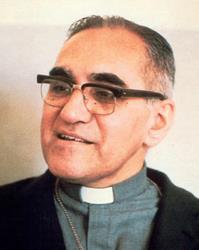I promised earlier in advent that we would be hearing from Oscar Romero again... Here is his take on the hope that is ours in the promised Kingdom of God... Worth hearing in the wake of frustration regarding the lack of outcomes in the Haass Talks. Advent is our opportunity to step back and take the long view...
It helps, now and then, to step back
and take the long view.
The kingdom is not only beyond our efforts,
it is beyond our vision.
We accomplish in our lifetime only a tiny fraction of
the magnificent enterprise that is God's work.
Nothing we do is complete,
which is another way of saying
that the kingdom always lies beyond us.
No statement says all that could be said.
No prayer fully expresses our faith.
No confession brings perfection.
No pastoral visit brings wholeness.
No program accomplishes the church's mission.
No set of goals and objectives includes everything.
This is what we are about:
We plant seeds that one day will grow.
We water seeds already planted, knowing that they hold future promise.
We lay foundations that will need further development.
We provide yeast that produces effects beyond our capabilities.
We cannot do everything
and there is a sense of liberation in realizing that.
This enables us to do something,
and to do it very well.
It may be incomplete, but it is a beginning, a step along the way,
an opportunity for God's grace to enter and do the rest.
We may never see the end results,
but that is the difference between the master builder and the worker.
We are workers, not master builders,
ministers, not messiahs.
We are prophets of a future not our own. Amen
Oscar A. Romero (Archbishop of El Salvador)

Comments